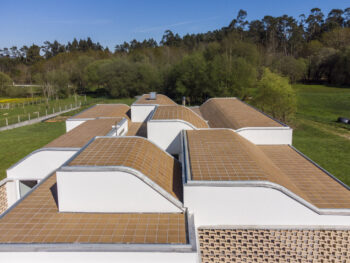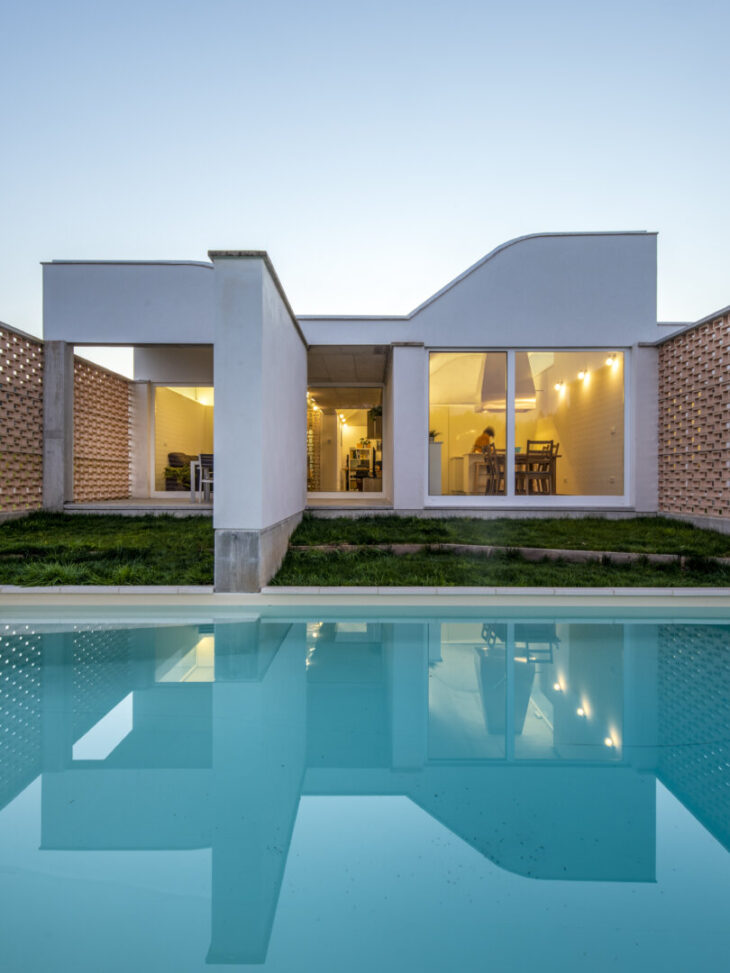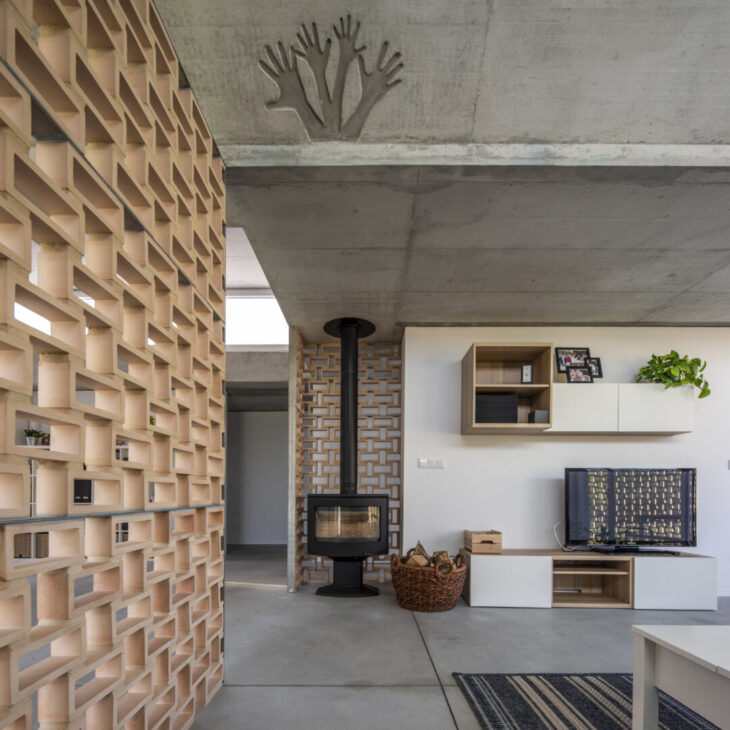
Galician Villa by Rodrigo Currás Torres Blends Tradition and Innovation Using Gres Aragón Pavers
 In the small village of Guisande, on the beautiful wild coast known as the Costa de la Muerte (La Coruña, Galicia, Spain), Galician architect Rodrigo Currás Torres has built a detached villa that stands out for its curved roof, clad in extruded stoneware pavers by Gres Aragón: a traditional product used in a unique way.
In the small village of Guisande, on the beautiful wild coast known as the Costa de la Muerte (La Coruña, Galicia, Spain), Galician architect Rodrigo Currás Torres has built a detached villa that stands out for its curved roof, clad in extruded stoneware pavers by Gres Aragón: a traditional product used in a unique way.
The villa is divided into different overlapping volumes which link up the interiors and the home’s different uses, striving to capture the essence of the local setting, where a linear wood stretches out at the end of a clearing. These juxtaposed volumes combine to form an ensemble unified by its ceramic rooftop.
The home’s space cells are its rooms, conceived as places where it must be possible to carry out the most basic functions required in a home, combining comfort with spaciousness and seclusion.
Its interiors are based on the notion of juxtaposed settings, so that the day-time part of the villa– the living spaces and areas for relaxing–lead through to the more private night-time areas, the bedrooms.
Traditional extruded stoneware pavers form waves on the roof
The tiled roof traces differing curved shapes, echoing the curved ceilings inside the volumes. The villa’s fragmented design includes a prism-like main volume, with a perforated rectangular ground floor, flanked by courtyards that let the sunlight in.
 The single-pitch roofs are designed to bring to mind the traditional rooftops of a small village. To achieve this, a natural clay material was chosen, whose colour and laid pattern would conjure up these traditional rooftops.
The single-pitch roofs are designed to bring to mind the traditional rooftops of a small village. To achieve this, a natural clay material was chosen, whose colour and laid pattern would conjure up these traditional rooftops.
The Galician architect chose tiles known as “tijoleiras” in the local language: emblematic 20x20cm square paving tiles by Gres Aragón that follow the curves of the roof, blending in with the landscape. The natural-coloured ceramic pavers unify the different volumes, evoking the essence and origins of the local backdrop.
The chosen stoneware is from the Natural collection: a timeless, simple, traditional extruded model. The pavers stand out for their high resistance and lasting beauty, still very much up to the minute. As the name of the collection indicates, the appearance of the pavers reflects the colour of the clays used to make them.
The villa also stands out for its ceramic screens, used to create transitions between its interiors and exteriors, closing off private areas while also allowing for a slight permeability between different settings. The ceramic screens, courtyards and angled views help to ensure privacy, while also filtering the light and contributing to different uses.
Architect Rodrigo Currás Torres
Rodrigo Currás Torres is a Galician architect who trained at Oporto School of Art (Portugal) and Helsinki University of Technology (Finland). He has had an architect’s studio in Moaña (Galicia) since 2005. Currás Torres has been singled out to receive different awards for his architecture. His projects stand out for their consideration of their surroundings and the local architecture.
About Gres Aragón
Gres Aragón benefits from its long-standing experience and dedication to the development and manufacture of ceramic tiles. From its early days, the company’s skill and know-how in handling clay and fire has evolved into an innovative production plant equipped with cutting-edge technologies and highly efficient products for contemporary architecture.
50% of the company’s sales are made on international markets, and the company is present in almost 120 countries around the world, with ample experience in products aimed at tile specifiers. Apart from Spain, the firm’s major markets are the USA and EU member states.
Throughout its 80-year history, the company has remained true to its values, based on care for its immediate social and natural environment, reinvestment and hard work, quality employment, integrity and innovation. Today it has three production plants and three logistics centres that serve project planners and customers around the world.
Gres Aragón and Faveker are part of the ceramic tile division of Grupo SAMCA, a consolidated Spanish business group operating in the fields of mining, renewable energies, plastic polymers, synthetic fibres, agri-food, real estate development, agrochemicals and logistics infrastructures, providing quality and stable employment for 3,500 people.